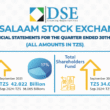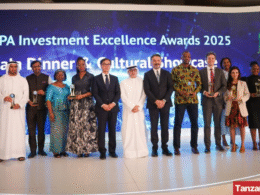The European Union (EU) is committed to continue working with Tanzania and to strengthen its relations with the country.
The statement was made by Roeland van de Geer, Head of the Delegation of the EU to Tanzania and the East African Community (EAC), in a recent study on European investment in Tanzania, by the European Commission.
“There is no doubt that with an increasing population, valuable natural resources, vast arable land and a strategic location in East Africa, Tanzania will continue to attract further investments from Europe,” the report indicates.
However, this attraction could be even higher if a number of obstacles to doing business could be efficiently tackled by the Government of Tanzania.
These include trading across borders, paying taxes, contract enforcement, immigration, policies and institutional constraints, energy generation, shortage of skills and corruption.
Despite these obstacles, Tanzania’s macroeconomic environment remains stable, free of the volatility experienced by more natural resource-dependent regional neighbors.
Finally, the study notes: “European investors stand ready to play their role of international investor reference partner in a dedicated forum for dialogue between the Government of Tanzania and the overall private sector in Tanzania.”
EU Tanzania Relations
Historically, the EU, together with Switzerland and Norway (EU+SN), and Tanzania have enjoyed a robust economic relationship based upon steadily growing investment and trade, and strong diplomatic ties.
Total trade between Tanzania and the EU today stands at more than USD2b. According to the latest data, Foreign Direct Investment (FDI) from the EU+SN to Tanzania grew by 120% over 2009–2013, from USD1b to USD2.2b.
This increase is mainly due to a combination of new equity investment and reinvested earnings in the mining, manufacturing, oil and gas, power and finance sectors.
Additionally, the Tanzania Investment Centre (TIC) attributes the creation of approximately 95,000 jobs to EU+SN companies in Tanzania.
“European companies are also among those that have been most proactive in partnering with government and educational institutions to develop and train the Tanzanian workforce,” the study notes.
Almost half of the European investors in Tanzania are from the UK, 11% from Italy, 6% from Germany, and the remaining 36% are from other European countries.










